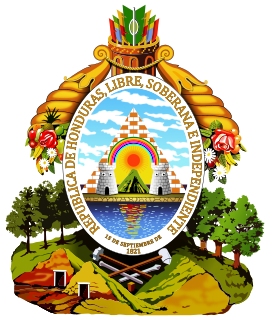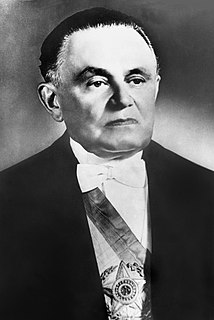
Itamar Augusto Cautiero Franco was a Brazilian politician who served as the 33rd President of Brazil from December 29, 1992 to December 31, 1994. Previously he was Vice President of Brazil from 1990 until the resignation of President Fernando Collor de Mello. During his long political career Franco also served as Senator, Mayor, Ambassador and Governor. At the time of his death he was a Senator from Minas Gerais, having won the seat in the 2010 election.
The People's Rally for Progress is a political party in Djibouti. It has dominated politics in the country since 1979, initially under the rule of President Hassan Gouled Aptidon. Today it is led by President Ismail Omar Guelleh and is in a coalition government with Front for the Restoration of Unity and Democracy (FRUD) and other parties.

Pascal Affi N'Guessan is an Ivorian politician who is the President of the Ivorian Popular Front (FPI). He was the Prime Minister of Ivory Coast from 27 October 2000 to 10 February 2003.

The National Congress of Brazil is the legislative body of Brazil's federal government. Unlike the state Legislative Assemblies and Municipal Chambers, the Congress is bicameral, composed of the Federal Senate and the Chamber of Deputies. The Congress meets annually in Brasília, from 2 February to 27 July and from 1 August to 22 December.

The Liberal Party of Honduras is a centre-right liberal political party in Honduras that was founded in 1891. The party is a member of the Liberal International. The PLH is identified with the color red and white, as the flag Francisco Morazan used in most of his military campaigns during time of the Central American Federal Republic.
A presidential election is the election of any head of state whose official title is President.

Prudente José de Morais e Barros was the third President of Brazil. He is notable as the first civilian president of the country, the first to be elected by direct popular ballot under the permanent provisions of Brazil's 1891 Constitution, and the first to serve his term in its entirety. His presidency, which lasted from 15 November 1894 until 14 November 1898, was marked by the War of Canudos, a campesinant revolt in the northeast of the country that was crushed by the Brazilian Army. He also had to face a break in diplomatic relations with Portugal that was successfully mediated by Queen Victoria of the United Kingdom.

Brazil elects on the national level a head of state—the president—and a legislature. The president is elected to a four-year term by absolute majority vote through a two-round system. The National Congress has two chambers. The Chamber of Deputies has 513 members, elected to a four-year term by proportional representation. The Federal Senate has 81 members, elected to an eight-year term, with elections every four years for alternatively one-third and two-third of the seats. Brazil has a multi-party system, with such numerous parties that often no one party has a chance of gaining power alone, and so they must work with each other to form coalition governments.

Honduras National Congress has 128 members (diputados); they serve four-year terms.

Elections to the United States House of Representatives were held in 1864 to elect Representatives to the 39th United States Congress. The election coincided with the presidential election of 1864, in which President Abraham Lincoln was re-elected.

Philippine elections are of several types. The president, vice-president, and the senators are elected for a six-year term, while the members of the House of Representatives, governors, vice-governors, members of the Sangguniang Panlalawigan, mayors, vice-mayors, members of the Sangguniang Panlungsod/members of the Sangguniang Bayan, barangay officials, and the members of the Sangguniang Kabataan are elected to serve for a three-year term.

Elections in Nigeria are forms of choosing representatives to the Nigerian federal government and the various states in Nigeria.
The Social Democratic Party is a political party in Benin.

Presidential elections were held in Brazil on 15 January 1985, the last to be held indirectly through an electoral college, and the last to be held under the military regime. The electoral college system was put in place so that the military elite that controlled the government could secure the election of the candidate chosen by the High Command of the Armed Forces as President. However, in 1985, due to the process of negotiated transition to democracy that started in the late 1970s, the politicians in the electoral college were placed under no coercion, and were allowed to choose the president of their choice.

The election of president and vice president of the United States is an indirect election in which citizens of the United States who are registered to vote in one of the 50 U.S. states or in Washington, D.C. cast ballots not directly for those offices, but instead for members of the U.S. Electoral College, known as electors. These electors then in turn cast direct votes, known as electoral votes, for president, and for vice president. The candidate who receives an absolute majority of electoral votes is then elected to that office. If no candidate receives an absolute majority of the votes for President, the House of Representatives chooses the winner; if no one receives an absolute majority of the votes for Vice President, then the Senate chooses the winner.

Indirect presidential elections were held in Brazil on 11 April 1964 shortly after the March coup. Humberto de Alencar Castelo Branco was elected President by the National Congress, receiving 361 of the 366 votes cast. José Maria Alkmin was elected Vice-President unopposed after Auro de Moura Andrade withdrew his candidacy.

The 1796 United States elections elected the members of the 5th United States Congress. The election took place during the beginning stages of the First Party System, as the Federalist Party and the Democratic-Republican Party clashed over the states' rights, the financial policies of Treasury Secretary Alexander Hamilton, and the recently ratified Jay Treaty. The Federalists maintained control of the Senate, and won control of the House and the presidency.

















